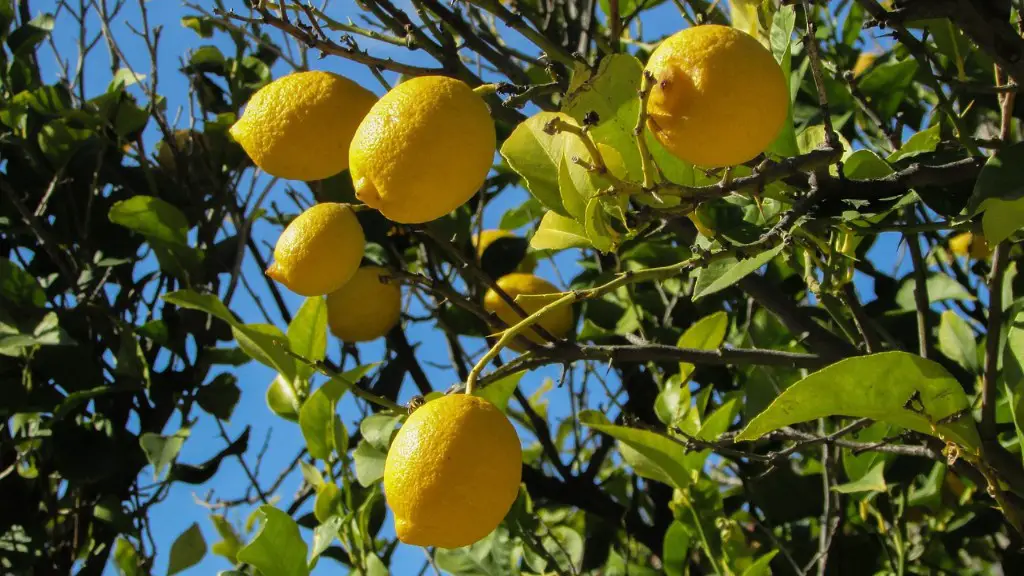Scale insects are a major problem on lemon trees, especially in humid environments. They can cause severe damage to the leaves, trunk, and branches of the tree, and can significantly reduce the amount of fruit produced. Fortunately, there are several ways to get rid of scale insects on your lemon tree.
One of the best ways to eliminate scale insects is through regular pruning. Allowing your lemon tree to become overgrown can create an ideal environment for scale insect infestation. Prune or trim any diseased or dead branches or leaves. Pruning can help to reduce the spread of scale insect infestations, as well as providing an improved environment for the tree.
Applying insecticides to your lemon tree can also help to control scale insects. Be sure to read and follow the product label carefully, as misuse of these products can cause more harm than good. Some insecticides are effective in killing scale insects, while others are best used as a preventative measure.
It’s also important to keep your lemon tree healthy by providing it with plenty of nutrients through fertilizers and organic mulches. This helps to keep the tree strong and less likely to suffer from infestations of scale insects. Make sure to remove any fallen leaves or fruit from around the base of the tree, as these can harbor scale insects.
Finally, if you’ve noticed a lot of scale insects on your lemon tree, you can also use a combination of these methods to get rid of them. For example, you may use a pesticide, prune any heavily infested branches, and apply mulch or compost around the base of the tree for added nutrients and a healthy environment.
Insecticides
Insecticides are a commonly used method for controlling scale infestations on lemon trees. There are a number of different insecticides available and it is important to select one based on the type of scale insect infestation that you are trying to eliminate. Before applying any insecticides, it is important to read the product label carefully and follow all instructions.
It is also important to note that some insecticides can be toxic to other beneficial insects, such as ladybirds and bees, so it is important to use them safely and responsibly. It is also a good idea to check with your local agricultural extension office to find out what type of insecticide is best suited for your particular situation.
When applying the insecticide, make sure it is applied thoroughly to all parts of the lemon tree affected by the scale insect infestation. Also, be sure to apply the insecticide when temperatures are below 28°C, as higher temperatures can cause the insecticide to burn the leaves of the tree.
Finally, it is also important to remember that insecticides will only be effective if used in combination with good cultural practices, such as regular pruning and mulching. By following these steps, you can ensure that your lemon tree stays healthy and free of scale insects.
Biological Control
Biological control involves the introduction of natural predators or parasites to an environment in order to control a particular pest or disease. For example, one method of controlling scale insects on lemon trees is to introduce predatory mites. These mites feed on scale insect larvae and help to keep their populations in check.
It is important to note, however, that it is not always possible to introduce predators or parasites into a particular environment. Therefore, it is important to research your particular situation before introducing any biological control methods.
One example of biological control that can be used is the use of parasitic wasps. These wasps lay their eggs inside of the scale insects, with the larvae usually killing the scale insect within a few days. This type of control is especially useful in large scale infestations of scale insects.
In addition to introducing predators and parasites, an integrated pest management program is another approach to controlling infestations of scale insects on lemon trees. This type of program can involve a combination of cultural, mechanical, biological, and chemical controls in order to control the scale insect populations on your tree.
Finally, it is important to remember that biological control methods take time to become effective, as the natural predators or parasites must first become established in the environment. Therefore, it is important to be patient and wait to see the results before taking any other type of control measures.
Soap Sprays
In addition to insecticides and biological control, soap sprays are another option for controlling scale insects on your lemon tree. These sprays are made from a combination of soaps and oils, which act to suffocate the scale insects and break down their protective outer shell.
Soap sprays are generally considered safe to use on edible plants, and are a good option for those looking for a more natural method of controlling scale insects. However, they must be reapplied regularly, as they tend to break down quickly in the environment.
When using soap sprays, it is important to make sure that the entire tree is covered, as any missed areas can become reinfested with scale insects. It is also important to note that soap sprays can cause leaf burn, so it is important to use them in moderation and make sure that the leaves are thoroughly saturated.
Another important consideration when using soap sprays is to choose the right time of day to apply the spray. It is important that the spray is applied early in the morning or late in the evening, when the temperature is cooler and the sun is not shining directly on the tree. This will help to prevent leaf burn and ensure that the spray is effective.
Finally, it is important to remember that soap sprays should always be used in combination with other control measures to ensure maximum effectiveness. By employing an integrated pest management strategy, you can ensure that your lemon tree remains healthy and free of scale insects.
Natural Remedies
In addition to the above methods of controlling scale insects, there are a number of natural remedies that can be used to help control their populations on your lemon tree. For example, neem oil is a natural pesticide that has been found to be effective at killing scale insects.
Another option is to create a mixture of garlic and chili pepper, which can be sprayed directly onto the leaves of the tree. This mixture is thought to act as a deterrent to scale insects, as they tend to avoid strong smells.
Finally, products such as BTK are also available, which are natural, microbial-based insecticides that have been found to be effective at controlling scale insects. These products must be applied according to the product label, however, as misuse can cause more harm than good.
In general, it is important to remember that natural remedies are a good option for controlling scale insects on lemon trees, but they must be used in combination with other control methods in order to be effective. By employing an integrated pest management program, you can ensure that your tree remains free of scale insects.
Sanitation
The last and perhaps most important strategy for eliminating scale insects on lemon trees is to practice good sanitation. It is important to clean up fallen leaves and fruit from the base of the tree, as these can provide an ideal refuge for scale insects to hide and reproduce.
In addition, it is also important to regularly inspect your lemon tree for any signs of infestation. If you notice any scale insects on the leaves or branches of the tree, it is important to take action immediately in order to prevent further infestations. Regular pruning and trimming of the tree can also help to eliminate scale insects and reduce their spread.
Finally, it is also a good idea to introduce natural predators or parasites into the environment. This can be done by planting certain flowers or herbs in the garden, or by purchasing and releasing beneficial insects such as ladybirds or lacewings. These insects can help to keep scale insect populations in check, and can provide your lemon tree with some much-needed natural pest control.
By employing a combination of these strategies, you can ensure that your lemon tree remains healthy and free of scale insects. Good sanitation and regular inspection of the tree can help to prevent scale insect infestations, while pest control techniques such as pruning and insecticides can help to eliminate any existing infestations.


